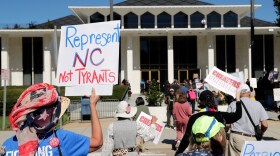North Carolina's top legislative Democrats on Monday praised a redistricting ruling by the state Supreme Court that overturned congressional and General Assembly districts as illegal partisan gerrymanders, and urged their replacement with fair boundaries.
But exactly how new lines must be formed and analyzed to meet constitutional muster remained murky, days after Friday's ruling by the sharply divided court.
While the order from the court's Democratic majority explained why the lines approved by the GOP-controlled General Assembly in November violated the state constitution, the directive didn't say which specific districts must be altered. Standards that lawmakers must meet to know replacement lines are lawful also are imprecise.
The order was filed less than three months after lawsuits challenging the maps were initiated. It gives the legislature until Feb. 18 to submit new plans to a lower court. The Supreme Court promised to have a final decision on those replacement boundaries by Feb. 23 — the day before candidate filing resumes for the May 17 primaries.
"I commend the court for expediting the process so that the citizens and voters of North Carolina will be able to vote and will be able to exercise their right to free elections," Blue told reporters at a news conference.
The majority's order said a more detailed opinion would follow, but it's unclear when that will be filed.
Republican legislative leaders were cautious Monday about what they'd do next. Pat Ryan, a spokesperson for Senate leader Phil Berger said in a text that Senate Republicans "do not have final plans at this time," citing in part a lack of clarity in Friday's order.
House Speaker Tim Moore told reporters, however, he anticipated that replacement maps would be voted on next week. He didn't yet have a specific schedule.
"We've been consulting with our attorneys to find out exactly what it is that the courts are looking for," Moore said. Judges would approve their own maps if the General Assembly doesn't enact some, the Supreme Court order says.
The voters and advocacy groups in the successful challenge of the maps said the lines were manipulated by Republicans to ensure the GOP would likely win 10 of the state's 14 U.S. House seats, as well as state House and Senate majorities, in almost any political environment.
A panel of trial court judges agreed last month the lines were "a result of intentional, pro-Republican partisan redistricting." But the judges said it wasn't the judiciary's place to alter lines based squarely on partisanship when the state constitution gives the duty of redistricting to the legislature, and left the lines in place. In a 4-3 decision, however, the Supreme Court reversed the ruling and said it was the judiciary's role to intervene.
Friday's order, signed by senior Associate Justice Robin Hudson, did refer to several types of mathematical analyses that could be used to demonstrate "there is a significant likelihood" that a plan "will give the voters of all political parties substantially equal opportunity to translate votes into seats." Doing so, the order says, would make a plan "presumptively constitutional."
Neutral redistricting criteria — such as making sure that districts are largely equal in population size and that the number of split counties are kept to a minimum — must not be subordinated to partisan criteria, the order says.
Blue declined to get into too many details of how the new maps should look, saying he wanted to wait for the detailed opinion. But a minimum, Blue said, "fair maps" wouldn't guarantee that Democrats or Republicans were going to win in a closely divided state politically like North Carolina.
Rep. Robert Reives of Chatham County, Blue's House counterpart, said fair maps would help end extreme responses to policy issues by requiring members of each party to work together. The argument is that such cooperation fades when one party is virtually assured of a majority.
Chief Justice Paul Newby, writing a dissent for the court's three Republican justices, said the majority had initiated a major expansion of the court's power and created requirements so vague "as to only allow this court to ultimately determine a plan's constitutionality."
Two of the Supreme Court justices currently held by Democrats are on the November ballot — Hudson is retiring and Associate Justice Sam Ervin IV is seeking reelection. Republicans would retake a majority on the court if they win one of those seats. Friday's ruling likely will become a big issue, especially in Ervin's race.
Should the General Assembly remain in Republican hands, lawmakers could redraw the congressional map in 2023 and feel more inclined to expect a favorable outcome on any appeal with a GOP majority at the court. The ability of lawmakers to redraw General Assembly districts later this decade appears very limited.





